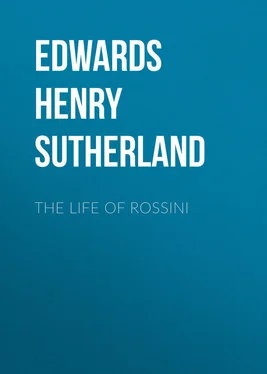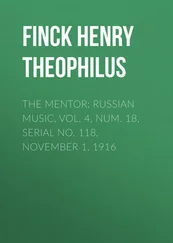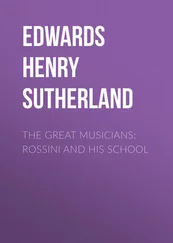Henry Edwards - The Life of Rossini
Здесь есть возможность читать онлайн «Henry Edwards - The Life of Rossini» — ознакомительный отрывок электронной книги совершенно бесплатно, а после прочтения отрывка купить полную версию. В некоторых случаях можно слушать аудио, скачать через торрент в формате fb2 и присутствует краткое содержание. Жанр: foreign_antique, foreign_prose, на английском языке. Описание произведения, (предисловие) а так же отзывы посетителей доступны на портале библиотеки ЛибКат.
- Название:The Life of Rossini
- Автор:
- Жанр:
- Год:неизвестен
- ISBN:нет данных
- Рейтинг книги:4 / 5. Голосов: 1
-
Избранное:Добавить в избранное
- Отзывы:
-
Ваша оценка:
- 80
- 1
- 2
- 3
- 4
- 5
The Life of Rossini: краткое содержание, описание и аннотация
Предлагаем к чтению аннотацию, описание, краткое содержание или предисловие (зависит от того, что написал сам автор книги «The Life of Rossini»). Если вы не нашли необходимую информацию о книге — напишите в комментариях, мы постараемся отыскать её.
The Life of Rossini — читать онлайн ознакомительный отрывок
Ниже представлен текст книги, разбитый по страницам. Система сохранения места последней прочитанной страницы, позволяет с удобством читать онлайн бесплатно книгу «The Life of Rossini», без необходимости каждый раз заново искать на чём Вы остановились. Поставьте закладку, и сможете в любой момент перейти на страницу, на которой закончили чтение.
Интервал:
Закладка:
Rossini then was not only a great composer, he was also a sort of Jack the Giant Killer. To be sure these giants of sopranists, with their vocal equestrianism, their shouting from the summits of mountains, and their plumes five feet high, were already approaching their last days. Still the great Velluti was in his vigour in 1814, and it was in that year that the young Rossini declared war against these Philistines, and succeeded in liberating vocal music from the tyranny of vocalists.
CHAPTER VIII
FROM MILAN TO NAPLES
ROSSINI would have been amused if any one had written a book about him and his music entitled “Rossini and his Three Styles.” He liked discussing the principles and also the practice of his art in good company – witness the “Conversations with Rossini,” recorded by Ferdinand Hiller. But he cared little for fine distinctions, and he is reported to have said that he knew nothing of French music, German music, or Italian music; that he only knew of two kinds of music – good and bad.
Nevertheless, all writers, painters, musicians, who have a style at all, have at least three styles – an imitative style, a tentative style, and finally, a style of their own. This division being admitted, Rossini entered upon his second style in writing “Tancredi,” and “L’Italiana in Algeri” (1813); and did not attain his third style until he wrote in the same year (1816) “Otello” for Naples, and “Il Barbiere” for Rome.
If it be thought absolutely necessary to place “Guillaume Tell” and Rossini’s French operas in a category by themselves, then we must say that Rossini had three styles (the consecrated number); and “Guillaume Tell” being manifestly in the third and last style, “Otello” must be put back to the second, and “Tancredi” to the first.
Theory apart, it is quite certain that Rossini, after his collision with Velluti, altered his system of writing for the voice – embellishing his airs, where he thought embellishments necessary, in such a manner that to embellish them further, at the will of the singer, was out of the question.
It is also certain that at Naples, from his arrival there in 1815, he passed under the artistic influence of Madame Colbran, his future wife, for whom he wrote no less than ten important parts, beginning with Elisabetta , and Desdemona , and ending with Zelmira and Semiramide .
In the meanwhile, between the historical “Aureliano,” which represents his breach with decorative vocalists, priding themselves on their individuality and their power of invention, on the one hand, and the equally historical “Elisabetta,” which represents his arrival at Naples, and the commencement of the period in which he cultivated serious opera alone, on the other, an interval of more than eighteen months must be supposed to elapse, during which Rossini wrote two operas, “Il Turco in Italia,” and “Sigismondo.”
The manager of La Scala wanted a pendent to “L’Italiana in Algeri.”
The basso Galli, who had for several years played with great success the part of the Bey in the “Italiana,” was now provided with the part of a young Turk who finds himself alone among Christians, as the “Italiana” had found herself alone among Mahomedans. Shipwrecked on the Italian coast, the youthful infidel reaches land and falls in love with the first pretty woman he meets. The pretty woman has, after the fashion of her native land, both a husband and a lover, and she torments them both by affecting a deep regard for the Turkish stranger. Galli was especially successful in his first air – a salutation to Italy, which was found very appropriate, inasmuch as the singer had just returned to Milan from Barcelona. The composer, however, was not so fortunate as the vocalist, the house resounded with cries of “Bravo Galli,” but “Bravo Maestro” was not once heard. The critics of the period found that there was a want of novelty in Rossini’s music, in fact that he had repeated himself. The truth is, continuations of successful works are seldom successful themselves. So much do first impressions count for, that the merit of a continuation must be superior to that of the original under pain of appearing inferior.
The shipwrecked Turk could not be permanently saved; but, true to his principles, Rossini rescued what he could from the general disaster. He had written an admirable overture for this “Turk in Italy,” which, when “Otello” was brought out, served with more or less appropriateness to introduce the Moor of Venice.
“Sigismondo” has left even fainter traces than “Il Turco in Italia.” It was produced at Venice (Fenice theatre) towards the close of 1814; and the night of its production Rossini, who always gave his mother the earliest news of the fate his works had met with, enclosed her a drawing of a bottle – or fiasco .
Rossini was not progressing. He had written nothing successful (though “Aureliano in Palmira” contained much that deserved to succeed) since the summer of 1813, when “L’Italiana in Algeri” was produced. This year of 1814 was the only one in which he ever received anything like a check; perhaps he was collecting himself for the great achievements of 1816, the year of “Otello” and “Il Barbiere.” In the meanwhile, even in 1814, he had done his year’s work. He had written two operas, besides a cantata, “Egle e Irene,” composed for the princess Belgiojoso.
At this time Rossini received only the miserable sum of about forty pounds for an opera. This money was paid to him by the impresario and represented the exclusive right of performing the work for two years. Few if any of his operas seem to have been engraved at the time of production, so that there was nothing to receive from music publishers, the sole refuge of dramatic composers in England (if dramatic composers in England still exist) to whom no payment is paid by managers for the right of representation.
Конец ознакомительного фрагмента.
Текст предоставлен ООО «ЛитРес».
Прочитайте эту книгу целиком, купив полную легальную версию на ЛитРес.
Безопасно оплатить книгу можно банковской картой Visa, MasterCard, Maestro, со счета мобильного телефона, с платежного терминала, в салоне МТС или Связной, через PayPal, WebMoney, Яндекс.Деньги, QIWI Кошелек, бонусными картами или другим удобным Вам способом.
1
Cenni di una donna gia contante sopra il maestro Rossini.
2
If Miçkiewicz had known, that the composer of the “Barber of Seville” was descended from the Russini, he would have claimed him as a Slavonian.
3
The Italian theatres are for the most part named after the parishes in which they stand.
4
The serious opera consisted of the following persons: The soprano or primo uomo [ homo , but not vir ], prima donna (generally a mezzo soprano or contralto ) and tenor; the secondo uomo (soprano) seconda donna and ultima parte (bass). The company for the comic opera consisted of the primo buffo (tenor) prima buffa , buffo caricato (bass), seconda buffa and ultima parte (bass). There were also the uomo serio and donna seria , generally the second man or woman of the serious opera.
Читать дальшеИнтервал:
Закладка:
Похожие книги на «The Life of Rossini»
Представляем Вашему вниманию похожие книги на «The Life of Rossini» списком для выбора. Мы отобрали схожую по названию и смыслу литературу в надежде предоставить читателям больше вариантов отыскать новые, интересные, ещё непрочитанные произведения.
Обсуждение, отзывы о книге «The Life of Rossini» и просто собственные мнения читателей. Оставьте ваши комментарии, напишите, что Вы думаете о произведении, его смысле или главных героях. Укажите что конкретно понравилось, а что нет, и почему Вы так считаете.












